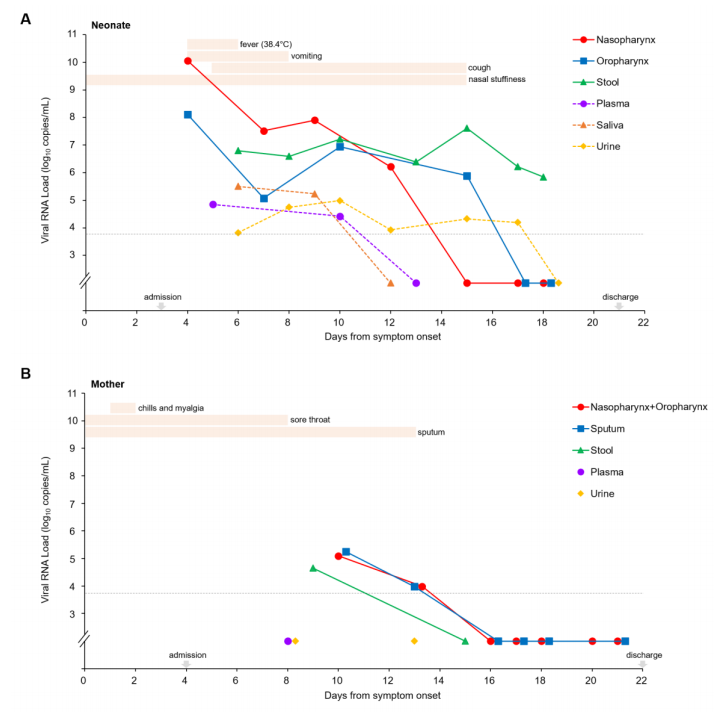hankyoreh
Links to other country sites 다른 나라 사이트 링크
S. Korean infant with COVID-19 found to have viral load 100 greater than mother’s

South Korea’s “youngest coronavirus patient,” an infant infected at the age of 27 days, showed a viral load as much as 100 times higher than those of her mother, who was diagnosed at the same time, research findings show.
SMG-SNU Boramae Medical Center, which is operated by Seoul National University Hospital, announced on Apr. 21 that a research team led by pediatrics professor Han Mi-seon had “conducted a comparative analysis of viral load for a 27-day-old infant who was hospitalized after being diagnosed with the COVID-19 virus along with her mother,” adding that a “report with this content was published on Apr. 16 in the latest issue of the international journal ‘Clinical Infectious Diseases.’”
According to the report, the infant’s viral load was 100 times higher than the mother’s when her symptoms were at their peak. The physicians explained that “the virus was detected at very high levels in the neonate’s respiratory organs early on in the infection before gradually decreasing, but the amount of the virus in her stool remained very high through the 18th day after the onset of symptoms.”
“A comparison of virus figures from a respiratory sample and stool on the 10th day after infection showed levels roughly 100 times higher than the mother’s,” they added.
In a telephone interview with the Hankyoreh, Han said, “A particularly large amount of the virus was found in the newborn’s feces.”
“Infants excrete solid and liquid waste frequently, and since caregivers may come into contact with it through diapers and so forth, people need to be more thorough about hygiene management with infants,” she said.
The infant exhibited symptoms including high fever over a two-day period after being hospitalized on Mar. 8, but did not experience severe symptoms. She continued nursing without receiving antibiotic or antiviral agents before eventually receiving a final negative test result on Mar. 23 and being discharged along with her mother three days later.
“It may be that virus reproduction levels are higher because small children’s immune capabilities are not complete,” said Kwon Jun-wook, deputy director of the Korea Centers for Disease Control and Prevention.
“But since the clinical symptoms’ severity may be low, it could present differences [from adults] in terms of transmission,” he added.
“Caution is needed among the health professionals treating pediatric coronavirus cases and people who are in self-isolation after contact,” he advised.
By Kwon Ji-dam, staff reporter
Please direct comments or questions to [english@hani.co.kr]

Editorial・opinion
![[Column] Season 2 of special prosecutor probe may be coming to Korea soon [Column] Season 2 of special prosecutor probe may be coming to Korea soon](https://flexible.img.hani.co.kr/flexible/normal/500/300/imgdb/original/2024/0426/3317141030699447.jpg) [Column] Season 2 of special prosecutor probe may be coming to Korea soon
[Column] Season 2 of special prosecutor probe may be coming to Korea soon![[Column] Park Geun-hye déjà vu in Yoon Suk-yeol [Column] Park Geun-hye déjà vu in Yoon Suk-yeol](https://flexible.img.hani.co.kr/flexible/normal/500/300/imgdb/original/2024/0424/651713945113788.jpg) [Column] Park Geun-hye déjà vu in Yoon Suk-yeol
[Column] Park Geun-hye déjà vu in Yoon Suk-yeol- [Editorial] New weight of N. Korea’s nuclear threats makes dialogue all the more urgent
- [Guest essay] The real reason Korea’s new right wants to dub Rhee a founding father
- [Column] ‘Choson’: Is it time we start referring to N. Korea in its own terms?
- [Editorial] Japan’s rewriting of history with Korea has gone too far
- [Column] The president’s questionable capacity for dialogue
- [Column] Are chaebol firms just pizza pies for families to divvy up as they please?
- [Column] Has Korea, too, crossed the Rubicon on China?
- [Correspondent’s column] In Japan’s alliance with US, echoes of its past alliances with UK
Most viewed articles
- 1[Column] Season 2 of special prosecutor probe may be coming to Korea soon
- 2No good, very bad game for Korea puts it out of Olympics for first time since 1988
- 3‘We must say no’: Seoul defense chief on Korean, USFK involvement in hypothetical Taiwan crisis
- 4Division commander ordered troops to enter raging flood waters before Marine died, survivor says
- 5Is Japan about to snatch control of Line messenger from Korea’s Naver?
- 6Korea’s 1.3% growth in Q1 signals ‘textbook’ return to growth, says government
- 7Is N. Korea threatening to test nukes in response to possible new US-led sanctions body?
- 8[Editorial] Korea’s surprise Q1 growth requires objective assessment, not blind fanfare
- 9[Editorial] New weight of N. Korea’s nuclear threats makes dialogue all the more urgent
- 10[Editorial] In the year since the Sewol, our national community has drowned